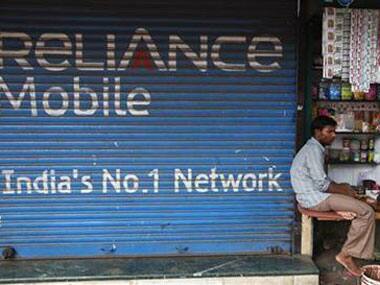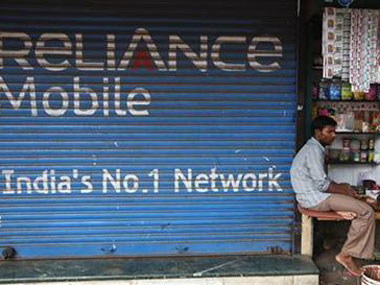Billionaire Anil Ambani’s Reliance Communications, India’s No.2 mobile carrier, has a $925 million US dollar convertible bond maturing in March at a conversion price of Rs 654 - more than nine times its current stock price.
With India’s economic growth buckling and the rupee at an all-time low, other companies, too, are expected to struggle to meet debt obligations in the coming months.
Seeking to finance acquisitions and their aggressive expansion, Indian companies raised funds through foreign currency convertible bonds (FCCBs) and bank loans before the financial crisis struck in 2008.
Many of those debts need to be repaid next year, and the timing could hardly look any worse.
The rupee has nosedived and is Asia’s worst performing currency this year, and the BSE Sensex has dropped by more than a fifth, making it even tougher for debt-laden companies already reeling under weak business growth.
“It’s a very tricky situation for Indian companies. If any default it will have a horrendous domino effect in the country,” said Nathalia Barazal, a Geneva-based portfolio manager for convertibles at Lombard Odier Darier, who owns $34 million worth of Indian engineer and builder Jaiprakash Associates’ $354.5 million convertible bonds that mature in September next year.
“Lots of firms rushed to convertibles markets thinking it’s a cheaper funding option,” she said. “I’m not positive on all Indian convertibles, but I hope some would find ways to restructure or, in a worst case, sell assets to pay debt.”
Impact Shorts
More ShortsReliance Communications’ investors are unlikely to convert their holdings into equity as the stock price has halved this year to below Rs 71. Shares in the company - which has reported eight straight quarterly profit falls and had net debt of $6.5 billion at end-September - were trading at about Rs 410 when the company issued the bonds in February 2007.
[caption id=“attachment_157307” align=“alignleft” width=“380” caption=“Reliance Communications’ investors are unlikely to convert their holdings into equity as the stock price has halved this year to below Rs 71. Reuters”]
 [/caption]
[/caption]
The cost of insuring against debt default at the company through credit default swaps has risen 515 basis points this year to 945 basis points, or $945,000 a year to insure every $10 million in debt.
Reliance Communications is looking to sell its telecoms tower unit, which could bring in more than $3.5 billion, media has reported, noting the company has had exclusive talks with private equity firms Blackstone Group and Carlyle Group.
BONDS OUT OF MONEY
More than two dozen companies on the BSE-500 index face FCCB redemption worth Rs 33000 crore by the end of the next fiscal year in March 2013, according to research by brokerage Edelweiss.
The convertible bonds are too expensive at current levels to be converted into stocks, and the weaker rupee, which slumped to an all-time low of 54.30 to the US dollar on Thursday, will leave issuers with a heavy redemption burden.
The rupee has lost close to a fifth of its value since July, and is adding to a growing sense of economic crisis in India.
“Given the current state of markets, FCCB conversion into equity shares won’t happen, and even refinancing would be difficult,” said Deepak Chokhani, India equity capital market director for Royal Bank of Scotland.
“These companies are probably waiting for markets to come back,” he said. “Unfortunately, given the macro environment today, it’s like a hanging sword over some companies.”
Sixty percent of outstanding FCCBs were raised at an exchange rate of below 42 rupees to the dollar, Edelweiss said.
Wind turbine maker Suzlon Energy has about $389 million worth of convertible bonds maturing by October, of which $247 million worth of bonds mature in June, according to Thomson Reuters data.
Zenith Infotech said in October it defaulted on its $33 million FCCBs which were due in September, and was in talks with bondholders to extend the repayment timetable.
While few predict a glut of defaults, pressure on earnings will increase as companies are forced to either rollover loans at higher interest rates or spend much-needed cash to redeem the convertible bonds.
“Raising funds is an expensive proposition now,” said a senior banker at state-run lender Bank of India, which has some FCCB restructuring mandates. “It’s a very, very difficult time for industry.”
Many companies, such as technology services provider Subex, are looking to raise fresh funds to redeem bonds, but are up against a weak stock market, tight liquidity in overseas markets and sharply higher interest rates.
Bangalore-based Subex last month said it obtained board approval to raise up to $135 million either through debt or equity, or both, to redeem two convertible bonds maturing in March that have a total redemption value of $131 million.
Subex launched the first tranche of the convertible bond in March 2007, to help fund its acquisition of Canadian technology firm Syndesis, at a conversion price of Rs 656.20, a 6 percent premium over its share price at the time.
Subex shares currently trade at about 30 rupees.
Moser Baer India, which makes floppy diskettes and computer peripherals, has two convertibles worth $43 million and $45.5 million maturing in June. The first bond has a conversion price of Rs 407.64; the second is at Rs 363.96.
The company’s shares, which were trading around Rs 430 when the first bond tranche was launched in June 2007, have slumped to below Rs 17 .
Market yields for Subex and Moser Baer imply “a high probability of default”, broker Kotak Securities said recently, noting only seven of the 117 outstanding FCCBs have their stock prices trading at a premium to the conversion price.
In an email response to a Reuters query, Suzlon said it was confident of fulfilling its FCCB repayment obligations as they mature. Reliance Communications, Subex and Moser Baer did not respond to mails seeking comment for this article.
Some Indian banks are stepping up to lend to companies that have convertible bonds maturing in the next six months, but the loans are costlier, banking sources said, which would raise companies’ interest costs and dent profitability.
India’s state-run banks are lending at 550-600 basis points over Libor for a 5-year term to companies seeking to redeem bonds, while private lenders Axis Bankand ICICI Bank are lending at around 700 basis points over Libor, the sources said.
“Those with bonds maturing after June are in a slightly better position because the domestic and overseas headwinds may not be that strong in the second half of 2012,” said a banker with a foreign bank in India, who asked not to be named.
“But others are having absolutely sleepless nights.”
Reuters
)